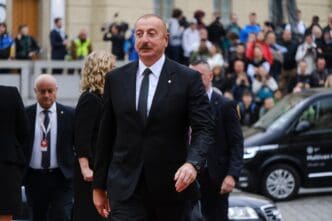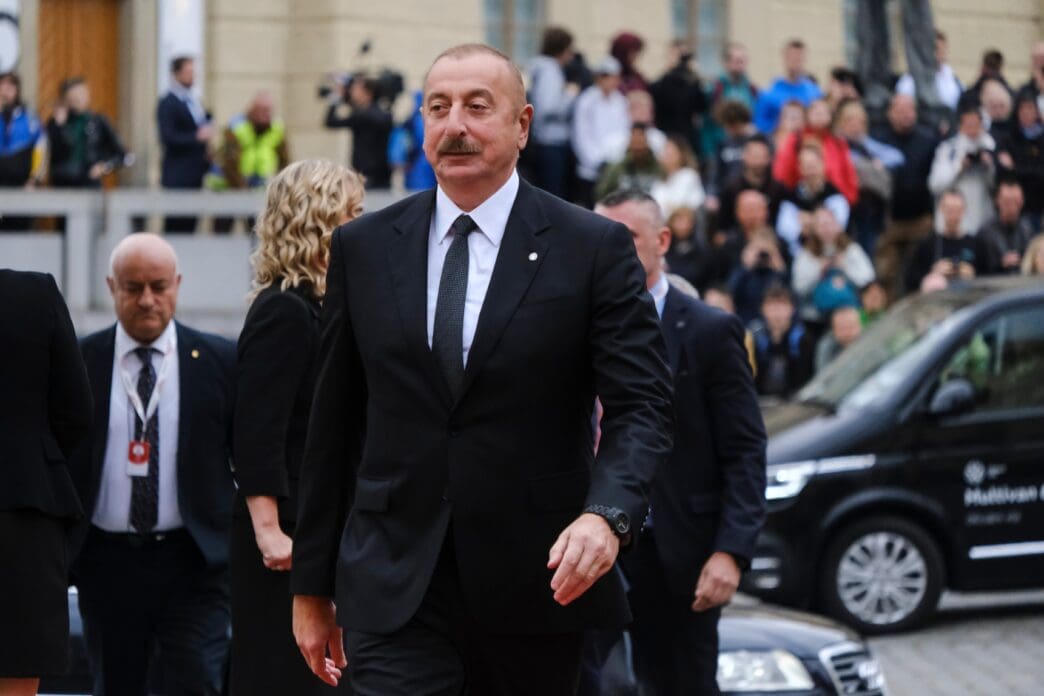Executive Summary
- Azerbaijan is solidifying its role in European political and energy dialogues, demonstrated by its consistent participation in European Political Community (EPC) summits, its commitment to supply 20 billion cubic meters of gas to the EU by 2027, and Baku’s selection to host an EPC summit in 2028.
- President Aliyev has strategically leveraged the EPC platform to assert Azerbaijan’s national interests, securing Armenia’s recognition of Azerbaijan’s territorial integrity, resisting biased mediation efforts, and preferring the Brussels trilateral format for peace talks.
- During the Copenhagen summit, President Aliyev and Armenian Prime Minister Nikol Pashinyan held significant peace talks, reaffirming agreements reached at the Washington Peace Summit initiated by President Donald Trump, and jointly welcomed the closure of the OSCE Minsk Process.
The Story So Far
- Azerbaijan has consistently leveraged platforms like the European Political Community to assert its strategic importance, secure recognition of its territorial integrity from Armenia, and establish itself as a reliable energy partner for Europe. This proactive stance informs its diplomatic engagements, including ongoing peace talks with Armenia that are moving beyond outdated frameworks like the OSCE Minsk Process and building on agreements from the Washington Peace Summit initiated by President Donald Trump, while also maintaining a firm preference for balanced mediation formats and resisting perceived biased involvement from other nations.
Why This Matters
- Azerbaijan’s consistent engagement in the European Political Community (EPC) and its recognized role as a reliable energy partner significantly bolster its geopolitical influence and strategic importance in European dialogues, further cementing its position as a key hub for international cooperation and critical trade routes. Concurrently, recent diplomatic engagements, including direct peace talks with Armenian Prime Minister Nikol Pashinyan and the formal closure of the OSCE Minsk Process, signal a tangible shift towards bilateral resolution of regional conflicts, building on agreements like those from the Washington Peace Summit initiated by President Donald Trump.
Who Thinks What?
- President Ilham Aliyev views Azerbaijan as a nation with increasing geopolitical influence and strategic importance, a reliable energy partner for Europe, and prefers the Brussels trilateral format for peace talks while resisting French mediation due to perceived bias.
- European Political Community (EPC) leaders, including European Commission President Ursula von der Leyen and European Council President António Costa, recognize Azerbaijan as a reliable energy partner and a crucial contributor to the Middle Corridor, acknowledging its growing prominence by awarding it the host role for an EPC summit in 2028.
- Armenian Prime Minister Nikol Pashinyan engages in peace talks with President Aliyev, reaffirms the importance of agreements reached at the Washington Peace Summit, discusses regional transport, and welcomes the closure of the OSCE Minsk Process as a step beyond outdated frameworks.
Azerbaijani President Ilham Aliyev participated in the 7th European Political Community (EPC) Summit in Copenhagen in October 2025, underscoring Azerbaijan’s increasing geopolitical influence and its active role in European political and energy dialogues. The summit also saw significant diplomatic engagements, including a meeting with Armenian Prime Minister Nikol Pashinyan to advance peace talks.
Azerbaijan’s Evolving Role in European Dialogue
The EPC, a biannual forum, serves to enhance political dialogue and cooperation among EU and non-EU states on critical issues like security, energy, and climate change. Azerbaijan has consistently leveraged this platform to assert its strategic importance and national interests since its inception.
At the inaugural EPC summit in Prague in 2022, President Aliyev secured Armenia’s recognition of Azerbaijan’s territorial integrity. He also resisted attempts to deploy a joint EU and French monitoring mission on Azerbaijani territory, ensuring its scope was limited exclusively to Armenia. President Aliyev previously stated that France’s open bias undermined its mediating role, leading to Azerbaijan’s firm stance against Paris’s involvement in the normalization process.
This principled position was reinforced by President Aliyev’s subsequent refusal to attend the 3rd EPC Summit in Granada, which featured a proposed five-way meeting involving France and Germany. Azerbaijan’s preferred diplomatic channel, as highlighted by presidential aide Hikmet Hajiyev, remains the Brussels trilateral format (Aliyev-Pashinyan-Michel), considered by Baku to be the only balanced framework.
Energy Partnership and Regional Connectivity
Azerbaijan has further solidified its profile within the EPC through its contributions to European energy security. At the 4th summit in Oxford in 2024, President Aliyev emphasized the European Commission’s recognition of Azerbaijan as a reliable energy partner, reaffirming Baku’s commitment to deliver 20 billion cubic meters of gas to the EU by 2027.
During the 6th summit in Albania in May 2025, European leaders, including European Commission President Ursula von der Leyen and European Council President António Costa, reiterated Azerbaijan’s status as a reliable partner, particularly concerning the Middle Corridor. Costa also announced that Baku would host an EPC summit in 2028, reflecting Azerbaijan’s growing prominence as a hub for international dialogue.
Diplomatic Engagements in Copenhagen
On the sidelines of the Copenhagen summit, President Aliyev held several key bilateral meetings. He met with Moldovan President Maia Sandu, congratulating her on her party’s recent parliamentary election victory and discussing prospects for bilateral cooperation, particularly in the energy sector, where Moldova expressed appreciation for Azerbaijan’s assistance.
A significant meeting also took place between President Aliyev and Armenian Prime Minister Nikol Pashinyan, marking their fourth encounter in as many months. The leaders addressed core issues of the peace agenda, reaffirming the importance of agreements reached at the Washington Peace Summit initiated by President Donald Trump.
Discussions also covered regional transport communications and infrastructure development, including Azerbaijan’s ongoing projects and Armenia’s TRIPP project. Both sides welcomed the unanimous decision to formally close the OSCE Minsk Process and its related structures, viewing it as a necessary step beyond outdated frameworks.
Azerbaijan’s Global Stature
These diplomatic exchanges highlight Azerbaijan’s increasing importance on the international stage, with global leaders actively seeking meetings with President Aliyev. As President Aliyev has noted, Azerbaijan has transformed its geography into a strategic advantage, fostering balanced regional relations and integrating into crucial East-West and North-South corridors.
Azerbaijan is increasingly seen not only as an infrastructural and economic hub but also as a significant center for inter-civilizational and inter-cultural dialogue. Its consistent foreign policy vision and rising influence position it as a central player in shaping the new dynamics of the European and global political landscape.








